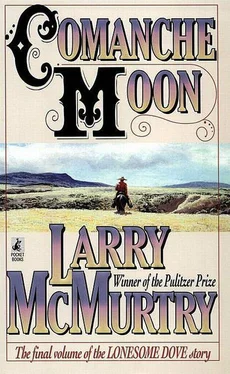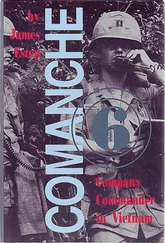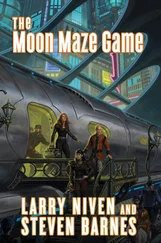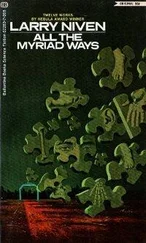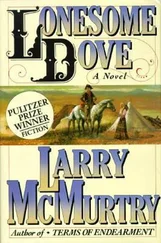Newt, in the lots with his rope, would look up every few minutes, to see if he could catch a glimpse of his mother's pale face in her window.
He knew his mother was dying; he spent hour after hour with his rope, throwing loops at chickens, or the milk-pen calf, or stumps, or posts, to distract himself a little from this frightening knowledge. He was so proficient with the lariat now that the milk-pen calf and even some of the chickens had taken to stopping submissively when he approached with the rope in his hands.
Sometimes, restless in his apprehension, Newt would walk out of town to the little graveyard. He had been to several funerals now, mostly funerals of people his mother knew from church--and he knew that soon there would have to be a funeral for his mother too. At the graveyard he would sometimes talk to his mother, aimless talk about the rangers, about some superstition Deets had told him, or some belief--sch as Deets's belief that Indians lived on the moon, having jumped their horses there at some time long ago when the moon had been only a few feet from the earth. Sometimes Newt would sit and watch the moon rise with Deets, hoping for a glimpse of the Indians; but he could never see them.
Mainly, though, Newt talked at the graveyard so he could get in practice to talk to his mother once she was dead. There were seldom many live people in the graveyard, but there were often one or two, usually an old man or old woman, or a bereaved young husband or wife whose spouse had died unexpectedly. Many times he had heard the old ones muttering over the graves of their loved ones--it seemed to him that talking to the dead must be an accepted practice. Probably the dead continued to want to know about the goings-on of the living; that seemed natural to Newt.
Of course, once his mother died, everything would change. He was hoping that Captain Woodrow and Captain Augustus would allow him to live with the rangers then. Even before his mother got sick he had begun to want to live with the rangers. But even if he had to live with Mrs. Coleman or Mrs.
Stewart until he could become a full-fledged ranger himself, it was to be expected that his mother would still want to know what he was doing, how his lessons were going, what had happened at the general store, whether Mrs. Coleman had decided to marry any of the men who wanted to marry her, whether Mrs. Stewart was still hitting Mr. Stewart with the barrel stave when he came in drunk and tardy.
Of course, too, she might want to know about Captain Woodrow, or whether there was any news of Jake Spoon, or if Captain Augustus had done anything unusual while drunk. Newt meant to keep a close watch on everything that happened in the community, so that he could come to the graveyard every day or two and give his mother a full report.
When the day was bright, and he was busy with his chores or his lessons, Newt would manage to put out of his mind for a few hours the fact that his mother was dying. He never mentioned his mother's sickness to anyone, not even to Ikey Ripple, who was so old now that he was practically a dead person himself. Ikey and Newt were good friends, though Ikey was so blind now that he had to feel Newt with his hands to make sure he was there. Ikey told Newt terrifying stories about the days when wild Comanche Indians came into town and ripped people's hair right off their heads. Newt would stop practicing with his rope while Ikey told him stories of the old days, when people often got shot full of arrows, or had their stomachs cut open.
Sometimes, while he talked, Ikey would whittle a stick with his little thin-bladed pocketknife. Although he never looked at the sticks as he whittled them, he never cut himself with the sharp little knife, either. Ikey whittled and whittled, shaving the stick away until it was only a small white sliver of wood, small enough to be used as a toothpick, although, since Ikey only had three or four teeth and didn't really need a toothpick, he would often give the smooth little slivers of wood to Newt, who saved them as treasures.
Scary as Ikey's stories were, nothing frightened Newt as much as laying on his pallet at night listening to his mother's labored breathing. He wished his ma could just sleep peacefully and easily, as she had when he had been younger; he didn't want her to have to draw such hard breaths.
Often he would be awake for hours, looking out the window, waiting for his mother's breathing to get easier.
He knew, though, that her breathing was growing harder, not easier; when it stopped she wouldn't be well, she would be dead, and would have to be taken to the graveyard and put in the ground.
Then he would have to begin talking to her in a new way: the way the living talked to the dead.
In his fright, in the darkness, Newt would begin to wish more than anything that Captain Woodrow and Captain Augustus would hurry and get back to Austin before his mother died. Every day Newt asked Ikey if he knew when they would be back, and every day Ikey said no, he hadn't heard, they would just be back when they got back.
Of course Captain Woodrow didn't come to see his mother anymore, as he had in earlier years. Though Newt saw him often, in the lots, Captain Woodrow rarely had much to say to him and seldom gave him pennies for sassafras candy now. Still, Newt wanted badly for him to come back. He felt the whole business of his mother's dying would be better taken care of if Captain Woodrow were there, and Captain Gus. They would see that Deets put the grave in a nice spot and see that there was plenty of singing; then, once the funeral was over, maybe they would let him move into the bunkhouse and live until he was big enough to carry a pistol and be a ranger himself.
That was Newt's hope, but he didn't tell it to his mother because she didn't much approve of guns. He didn't intend to mention it while his mother lived; it might make her mad, and when she was mad she coughed up blood, a thing that upset Graciela so that she would start crying and fanning herself and calling out the names of saints, as if it were she, and not his mother, who was dying. Mainly, Newt talked about his dream of having a pistol to Deets and Pea Eye, who saw no reason why he shouldn't have a pistol, and even, now and then, let him hold their own pistols. Sometimes, if they turned their heads, he would even point the pistol at the milk-pen calf, though of course he didn't shoot.
Long before Buffalo Hump came to the dry lake where the first people had lain in wait to catch the wild horses that came to refresh themselves at the little seeping spring, he wished he had used better judgment in picking a horse for his own last journey. The problem was that the old horse he had chosen had worn away all his teeth; in the canyon there was tall grass that he could masticate, but on the dry llano, in the vicinity of the Lake of Horses, there was no tall grass. The old horse was reduced to dirtying its nose as it tried to get at the sparse, short grass with its yellow nubs of teeth. Though the horse had frisked along briskly for some twenty miles, its strength soon gave out and it became what it was: an old horse slowly dying for lack of teeth. That was the way of old horses, just as shaky hands and wavery eyesight was the way of old men. Buffalo Hump knew he had made a poor choice. He wanted to reach Black Mesa, to sing his way into death among the black rocks that were the oldest rocks. Some believed that only in the black rocks were the spirits that welcomed one into death.
But, because the old horse had slowed to a walk, Buffalo Hump was still a long way even from the Lake of Horses. He knew, though, that if the little spring was still seeping, the old horse might refresh itself and make it on to Black Mesa.
The old horse was so weak now that he was only stumbling. For a time Buffalo Hump dismounted and led him, a thing he had not had to do in his long life as a horseman. Always, when a horse of his came up lame, he had simply left it, switching to another horse or going on foot if he had no other horse. He had owned many horses in his life and had never let a failing horse slow him down.
Читать дальше
